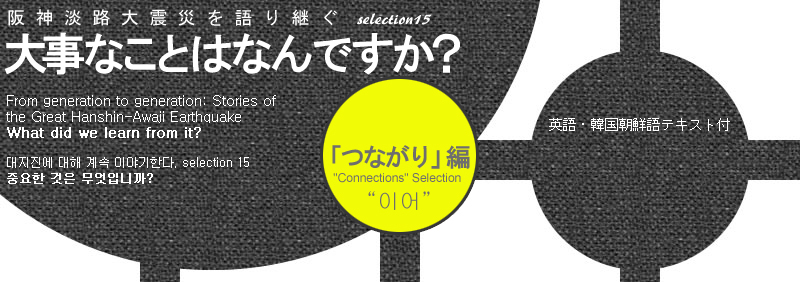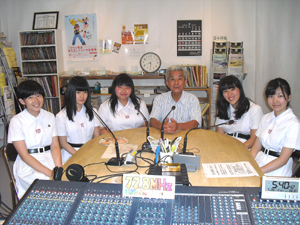Having an interest in each other, just as it was immediately after the earthquake disaster
Kana OKADA、
Akemi SHIMANO、
Shoko HIRANO
Natsuki YASHIKI、Misaki KURIKI
– Kobe Shoin High School, Broadcasting Club
■About the title “’Sukima’ wo umete” (Filling in the gaps)
When thinking about a program about the earthquake disaster, we felt that a ‘gaps’ (sukima) has grown in the hearts of the people of Kobe. And we had a desire to fill in these ‘gaps’.
■What led to the making of the program
We gathered members from those who wanted to be involved in making a radio program and got started on making the program for the NHK contest. Besides us, there were those who made radio programs with themes like ‘what makes people laugh’, ‘sexual identity disorder’ and ‘drugs’, and other groups made TV dramas. We were 1 year old when the earthquake disaster happened, and had learned a little about it at elementary school. We were also concerned about the vacant plots, etc. near our house.
♪First half of the radio drama “’Sukima’ wo umete”
(Filling in the gap)
On January 17, 2010, we took part in the ‘1.17 no Tsudoi’ (earthquake disaster remembrance event). On this day, 15 years had passed since the earthquake disaster. Since we were born just before the earthquake, we have almost no memory of it.
“What day did the earthquake happen?” “I’m happy I wasn’t born then” Comments liked these showed that Kobe high school students showed no interest in the earthquake disaster.
At the ‘1.17 no Tsudoi’ event, we interviewed some victims of the earthquake disaster. “I think the number of people who experienced the earthquake disaster as decreased. We can’t get through to those who don’t know what it was like. But it should never be forgotten.” “Only the second floor of the house was left. Mother and child sleeping on the first floor were crushed.” “I don’t want to be interviewed.”
■Interviewing 100 people
We thought that it was normal that all the victims of the disaster knew about it, and young people didn’t. We felt that different people had different ideas. And at the memorial event on January 17 at Higashiyuenchi Park, some people didn’t readily respond to our interview. There was a huge difference in how people who experienced the earthquake disaster and those who didn’t felt. We interviewed a newspaper reporter who covered the events at the time; a person in the Self Defense Forces who went to aid people in the disaster hit area. We heard many tales of hardship we had never heard of before. These stories seem not to have been told or heard enough of.
The theme of the interview was by no means light, and in the interviews we heard stories of people who had lost their homes. We realized how little we had thought about the earthquake disaster and felt we had to change.
■Hardships making a 7-minute radio program
We chose interviews we felt were moving. Even those were too many. We felt this was a pity because there were good interviews we would be able to use.
♪First half of the radio drama “’Sukima’wo umete” (Filling in the gap)
Adults said things like, “If you didn’t experience that moment, there is no way you could share those experiences.” “It can’t be helped that the memories and feelings about the disaster are fading. Forcing them on people is strange.” And so on. People seemed to pass it over with ‘It can’t be helped.’ And because of this, we young people have no interest in what happened.
There are three groups; young people who are not interested in knowing about the Hanshin-Awaji Earthquake disaster, victims who, after 15 years, still can’t talk about the hardships, and adults who pass the whole thing over with ‘it can’t be helped’ All three are separated. There are widening gaps in the hearts of Kobe. We need to have more interest in each other just as it was immediately after the earthquake. What we want to do is to ‘fill in the gaps’ in the hearts of the people of Kobe.
■Club Activities
Since Shoin high school doesn’t have broadcasts during the day, we are always producing programs and doing MC at events.
Our result of the NHK contest was 3rd place and so we didn’t proceed to the all Japan contest. It wasn’t a prize we wanted. What we wanted was to let the whole country know about Kobe.
■Positive things that came from this program
Our families listened to it. They were surprised at the gap between how young people and those who experienced the earthquake disaster. They had no idea about how divided people felt and thought about the disaster, and it was good that they got to know this. We want to do our best to fill in the gaps, not only through this program, but other programs too. We have been able to do things ordinary high school students couldn’t do. Through making this program, we are happy that the eyes of the world are paying attention.

